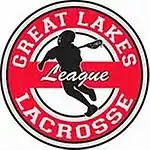Great Lakes Lacrosse League
The Great Lakes Lacrosse League (GLLL) is a regional organization of non-varsity men's club field lacrosse programs in the Midwestern United States. The GLLL was founded in 2004 to provide a competitive league for teams in the Midwest who want to play in a well-organized league outside of NCAA restrictions and without the expense of being a "virtual varsity."
 | |
| Sport | Field Lacrosse |
|---|---|
| Founded | 2004 |
| President | Hal Rosenberg |
| No. of teams | 46 |
| Most recent champion(s) | Wisconsin Red (2019) |
| Official website | Great Lakes Lacrosse League |
The GLLL has 40 teams from eight different states: Illinois, Indiana, Iowa, Michigan, Minnesota, North Dakota, South Dakota, and Wisconsin. The league is divided into six geographic divisions. Members of the GLLL strive to find a greater balance between athletics, personal life and academics. The season culminates each year with a championship tournament.
History
The GLLL originally formed with nine club teams in 2004. The founding teams were: Carleton College, Loyola University Chicago, Northern Michigan University, St. Norbert College, University of Wisconsin, University of Wisconsin–La Crosse, University of Wisconsin–Platteville, University of Wisconsin–Whitewater and Mad Cow Lacrosse Club (Milwaukee).
League play
GLLL league play consists of several mini-tourneys per season where multiple teams play each other at one site. Playing two games in a day allows teams to get their regular season schedule of approximately 8–10 games completed over five weekends in the spring. The season culminates in the championship tournament weekend in which all teams participate and are seeded by regional rankings.
The GLLL is grouped into six divisions. Each division winner receives a championship plaque for their season and, along with two wildcard clubs, compete for the championship title. The remaining teams compete in a second-tier consolation bracket. Trophies are awarded for first through third place in both championship and consolation brackets. This format allows both strong teams and developing programs a more competitive experience.
Teams by division
Central Division
- Marquette
- Northern Michigan/Michigan Tech
- Wisconsin Grey
- Wisconsin Red
- Wisconsin White
- UW-Milwaukee
- UW-Stevens Point
- UW-Whitewater
- UW-Platteville
Chicago Division
- Bradley University
- University of Chicago
- DePaul University
- University of Illinois-Chicago
- Lake Forest College
- Loyola University Chicago
- Northern Illinois
- Northwestern University
- Saint Xavier University
- Western Illinois University
Eastern Division
- Holy Cross (IN)
- Michigan
- Michigan State
- Northwood
- Notre Dame Blue
- Notre Dame Gold
North Division
- Bethel University
- St. Cloud State
- St. Olaf
- UW-Eau Claire
- UW-River Falls
- UW-Stout
Western Division
- Carleton
- Dordt
- Gustavus Adolphus
- Iowa
- Minnesota State-Mankato
- North Dakota
- South Dakota State
- UW-La Crosse
- Winona State
GLLL Championship history
| Season | Champion | Runner-up | Result | Notes |
|---|---|---|---|---|
| 2009 | Wisconsin | Holy Cross (IN) | 6–4 | Tournament MVP Jeff Byers (Holy Cross)[1] |
| 2010 | Holy Cross (IN) | Wisconsin | 6–5 | Tournament MVP Jeff Byers (Holy Cross)[2] |
| 2011 | Milwaukee | UW-Platteville | 12–5 | Tournament MVP Jack Peterson (Milwaukee) |
| 2012 | Wisconsin Red | Holy Cross (IN) | 9–8 | |
| 2013 | Wisconsin Red | Notre Dame | 8–5[3] | |
| 2014 | Notre Dame | Wisconsin Red | 4–3[4] | |
| 2015 | Marquette | Wisconsin Red | 7–6 | Tournament MVP Dan Javor (Marquette) |
| 2016 | Notre Dame Gold | Notre Dame Blue | 9–6 | |
| 2017 | Notre Dame Gold | Wisconsin Red | 8–7 | |
| 2018 | Notre Dame Blue | Wisconsin Red | 9–6 | |
| 2019 | Wisconsin Red | Northwestern | 3–2 |
References
- "Saints Finish Second in GLLL". Holy Cross College Athletics News. 27 April 2009.
- "2010 Great Lakes Lacrosse League Champions!!!". Holy Cross College Athletics News. 25 April 2010.
- "Red Team wins the 2013 GLLL Championship". Badger Lacrosse. 14 June 2013.
- "ND Club Lacrosse Game Schedule". ND Club Lacrosse. 27 April 2014.